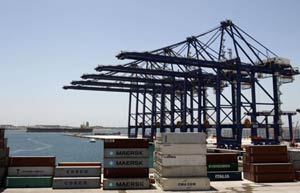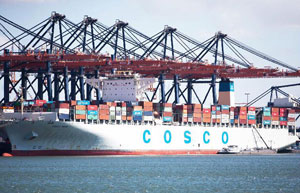|
 |
 |
According to CANSI, more than 55 Chinese shipyards have begun to produce different types of maritime engineering vessels or equipment, from low-end offshore support vessels to $600 million oil rigs for both domestic and international buyers, including China National Offshore Oil Corp, China Huaneng Group, Exxon Mobil Corp and Royal Dutch Shell Plc.
Sinopacific Offshore and Engineering Co, another Qidong-based maritime product manufacturer, secured two orders in the past three months to build liquefied ethylene gas carriers for two Norwegian companies—Ocean Yield ASA and Odfjell Gas Shipowning AS. Three of the ships have a capacity of 36,000 cubic meters and four have a capacity of 22,000 cu m. They are scheduled for delivery between 2016 and 2017, respectively.
Sinopacific also signed a subcontract with South Korea's Hyundai Heavy Industries Co earlier this year to manufacture modules for the Moho Nord field project developed by Total SA, a French oil and gas company, in the Republic of Congo.
Liang Xiaolei, chairman of Sinopacific, said as China has abundant offshore oil reserves, the orders from the domestic market will rise and Chinese energy companies will be more inclined to place orders from domestic players as their product price, maintenance costs and other after-sales services are all cheaper than South Korean and other foreign companies.
Chinese shipyards ask 12 percent of the total cost to secure an order for jack-up oil rigs or large-scale crane vessels. The best South Korea and Singapore can offer is between 30 and 35 percent. Chinese companies also offer a better price between 25 and 30 percent cheaper than both of these rivals.
"Though many global oil companies still favor South Korea or Singapore, the biggest challenge is that they don't have enough coastal land, manufacturing facilities and workers, as well as working schedules for new orders to hold back China's expansion," said Liang.
In comparison with South Korea and Singapore's land constrained manufacturing facilities, their earliest available working schedules are in 2017. However, large Chinese shipyards can pick up work as early as 2015.
Dong Liwan, a professor at Shanghai Maritime University, said South Korean companies will have a hard time competing with Chinese shipyards.
"Apparently, Chinese shipyards are not focusing on short-term profit," he said. "They are seeking to shift the market to China because most of the companies are State-owned enterprises and have flexible access to commercial and policy banks for loan."
